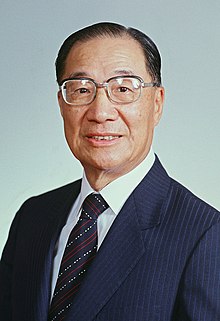Yu Kuo-hwa
Yu Kuo-hwa ( Chinese 俞國華 , Pinyin Yú Guóhuá ; born January 10, 1914 in Fenghua , Zhejiang ; † October 4, 2000 in Taipei ) was a Taiwanese politician of the Kuomintang who was Prime Minister of the Republic of China between 1984 and 1989 .
Life
Yu Kuo-hwa studied at Harvard University and the London School of Economics and Political Science (LSE). During the Second World War and the Chinese Civil War, he was a close collaborator of Generalissimo Chiang Kai-shek , the founder of the Republic of China, and after the establishment of the Republic took on numerous functions within the government and the Kuomintang . On November 29, 1967, he succeeded Chen Ching-yu Finance Minister in the cabinet of Prime Minister Yen Chia-kan and held this office until he was replaced by Kwoh-Ting Li on June 25, 1969. He then resigned on June 25, 1969 Hsu Po-yüan as governor of the Central Bank of China (CBC) and held that post for fifteen years until May 30, 1984, when Chang Chi-cheng succeeded him on June 21, 1984. At the same time he dissolved Yang Chia-lin on December 1, 1977 as chairman of the Council for Economic Planning and Development and held this position in personal union until his replacement by Chao Yao-Dong on June 1, 1984. In this position he was instrumental in the Involved in expanding exports, initiating tax reforms and using tax revenues to fund new programs and balance the budget.
On May 20, 1984, Yu Kuo-hwa succeeded Sun Yun-suan as Prime Minister (President of the Executive Yuan ) and held this office until May 21, 1989, when Lee Huan succeeded the former General Secretary of the Kuomintang .
During his five-year term in office, he initiated democratic reforms and an economic development program with 14 projects despite political and financial scandals and natural disasters. Its economic policies, including internationalization and liberalization , became milestones in the Republic of China's economic development program. In 1987 he introduced fundamental reforms and changes such as the end of martial law and the restriction of foreign exchange . In addition, the right to form opposition parties , register new daily newspapers and travel to mainland China for family purposes was introduced. Meanwhile, the country quickly became an economic giant that maintained its status as the US's main exporter and leading trading partner despite strong US pressure to reduce the trade imbalance between the two states. Yu Kuo-hwa led Taiwan through one of the most difficult periods in the country's history, enjoying the trust of President Chiang Ching-kuo , despite the fact that several opposition leaders and MPs criticized him. As an administrative expert, he himself saw the importance of law and order as the basis for democracy and growing prosperity.
Web link
- Entry in rulers.org
Individual evidence
| personal data | |
|---|---|
| SURNAME | Yu, Kuo-hwa |
| ALTERNATIVE NAMES | Yú Guóhuá; 俞國華 |
| BRIEF DESCRIPTION | Taiwanese politician |
| DATE OF BIRTH | January 10, 1914 |
| PLACE OF BIRTH | Fenghua , Zhejiang |
| DATE OF DEATH | October 4, 2000 |
| Place of death | Taipei |
